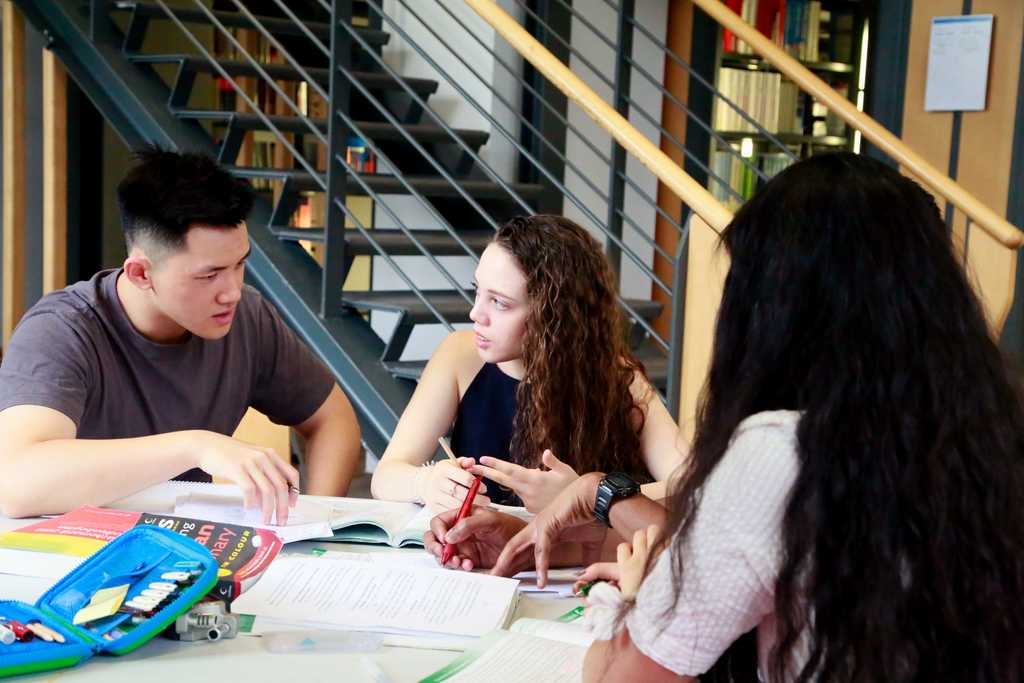THE WAY TO A GERMAN UNIVERSITY
The International Study Centre Thüringen at the Ernst-Abbe-Hochschule Jena offers you optimal preparation for studying at a German university or university of applied sciences.
The Foundation College offers preparatory courses for foreign students from non-EU countries who cannot apply directly to German universities. Our friendly and highly qualified teachers will prepare you for the final test - the so called “Feststellungsprüfung" (FSP). After the test you will achieve a university admission permit (“Hochschulzugangsberechtigung”) which enables you to study at a German university or German university of applied sciences.
Our students gain conditional admission from the Jena University of Applied Sciences. During the study period at our college you will enrol as a student at the Jena University of Applied Sciences, so you will be treated as all other German university students and get many benefits.
After graduation from our Foundation College, the admission to the Jena University of Applied Sciences is guaranteed. The tuition fee for Bachelor (3 years) and Master (2 years) is free. Students are also free to apply to any other German university. The diploma is valid for applying to all German universities.
Partner Universities

The Ernst-Abbe-University Jena (EAH) was founded in 1991 as the Jena University of Applied Sciences and was one of the first in the new federal states. For several years it has not only been Thuringia's largest, but also its most research-intensive university for applied sciences.
Nearly 5,000 young people are currently studying with us in bachelor's and master's degrees in
engineering, business administration, health and social sciences.
The EAH is based on four pillars:
- Engineering Sciences
- Business Management
- Social Sciences
- Health Sciences
Students have the option to choose from about 50 different bachelor's and master's degree
programmes in nine departments.
- Business Administration
- Electrical Engineering and Information Technology
- Fundamental Sciences
- Mechanical Engineering
- Medical Engineering and Biotechnology
- Health and Nursing
- SciTec (Science and Technology)
- Social Work
- Industrial Engineering
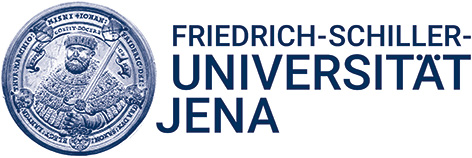
The Friedrich-Schiller-University Jena was established in 1558 and is one of the ten oldest universities in Germany.
It was renamed after the poet Friedrich Schiller who was teaching as a professor of philosophy. It is one of the five German universities listed in The Coimbra Group (It is a university network composed of 41 European universities, many of them are Europe’s oldest and most prestigious universities. It is sometimes called “the European Ivy League”.)
Jena University is also one of the founders of The German Centre for Integrative Biodiversity Research (iDiv) Halle-Jena-Leipzig. It is a research centre of the German Research Foundation (DFG). The University is the only German university with a seat for Gravitational Theory and one for Caucasus Studies. The University has ten faculties.
In the history of Jena University, many people have become notable in their fields, both academic, and in the world. Famous examples are: Friedrich Schiller, J.W. von Goethe, G.W.F Hegel, Ernst Karl Abbe, Johann Friedrich Herbart, Johann Gottlieb Fichte, Friedrich von Schlegel, Karl Max, Carl Zeiss, among many others.
It is affiliated with six Nobel Prize winners, most recently in 2000 when Jena’s graduate Herbert Kroemer won the Nobel Prize for physics.
Courses at our Foundation College
We offer different preparatory courses at our Foundation College in Jena. After passing the T-, M- or W-Course and the final exam (FSP), you are entitled to study at a German university (university or university of applied sciences). The electable subjects depend on which preparatory course you have previously taken with us (T-Course, M-Course, W-Course).
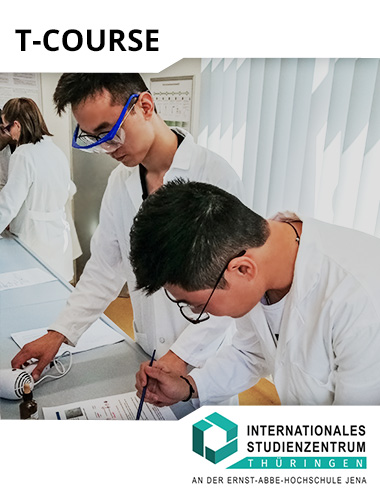
T-Course (T-Kurs) for mathematical, science or technical degrees
After the T-Course, you may apply for the following majors for your Bachelor study at a German university:
- Electrical Engineering
- Technology
- Precision Engineering
- Micro Technologies / Physical Engineering
- Opto Electronics
- Laser and Optical Technologies
- Physics
- Mathematics
- Automation Technology / Information Technology
- Computer Science
- Materials Technology
- and many more...
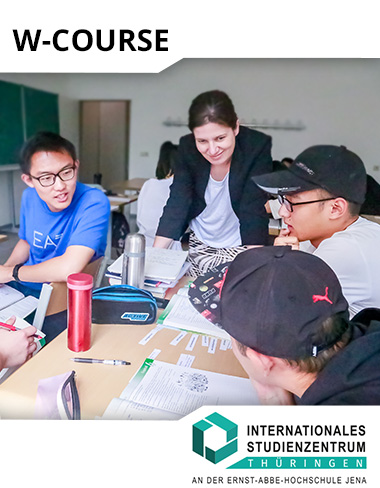
W-Course (W-Kurs) for business, economics and social science degrees
After the W-course, you may apply for the following majors for your Bachelor study at a German university:
- Business Administration (BWL / Business Management)
- Economics (VWL / Economics)
- Economics
- International Business Studies
- Business Informatics
- Industrial Engineering (focus on Mechanical Engineering)
- Industrial Engineering (focus on Electrical Engineering)
- and many more...
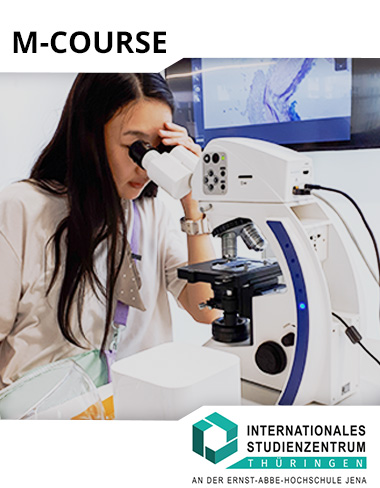
M-Course (M-Kurs) for medical, biological and pharmaceutical degrees
After M-Course, you may apply for the following majors for your Bachelor study at a German university:
- Medical Science
- Medical Treatment
- Health Management
- Psychology
- Biology
- Pharmacology
- Dentistry
- Veterinary Science
- Pharmaceutical Chemistry
- And many more…

Course Duration:
T-Course, M-Course and W-Course: 2 semesters
Course start:
Winter semester (~October until June)
Summer semester (~April until December)
Application deadlines:
Winter semester: August
Summer semester: February
Course fee:
7,000€ (excl. FSP)
Admission requirements:
- high school degree
- German level B1 (or similar certificate)
Visa:
Before entering Germany, applicants must apply for a study applicant or student visa at the German embassy (or consulate) in your country. It should be noted that it is NOT possible to convert a tourist or any other visa into a student visa after entering Germany. Applicants from China and Vietnam must present an APS certificate.
Please contact us for more detailed information!
Benefits

Our college is an institute for international university applicants. In addition to conveying specialised knowledge, the classes promote the acquisition of general and specialist competences and language proficiency fundamental for successfully completing a degree programme. These competences are tailored to the requirements of university studies in Germany in order to guarantee sustainable studying ability.
- General competences for a degree programme
- Language proficiency for a degree programme
- Subject competences
We teach German, mathematics, computer science, English, physics and chemistry. Final exam subjects include German, physics and mathematics. The certificate examination is carried out at our location in Jena in June and December. It consists of written and some oral parts.
Once you have passed the final examination, the way to a degree in Germany is clear. Your advantage if you decide to take a course at the Thüringen Study Centre: The examination takes place locally as an internal exam. In other institutions, only an external examination is prepared, which must then be taken by the district government. This is not the case with the Thüringen Study Centre, where internal degrees are recognised, and we have a high rate of success.
Study in Germany
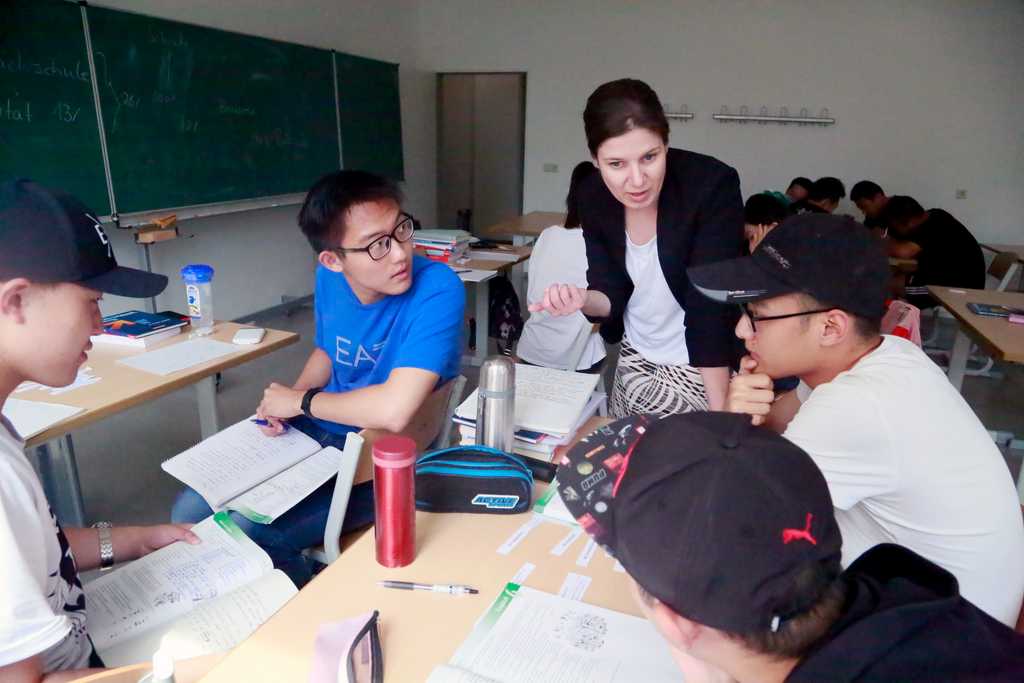
- Germany is the backbone of Europe's economy and a very strong industry and manufacturing sector. With many world-renowned large enterprises, such as Volkswagen, Mercedes-Benz, BMW, Henkel, Siemens, DHL, etc., as well as decades of the world's largest export volume. All these provide a broad employment platform for foreign students in Germany.
- Germany has a world-class education system and it is also the initiator of modern universities. Many country's modern university systems originated from German universities.
- High-quality education is as famous worldwide as the reputation of "Made in Germany". Germany has 429 universities, and many of them have a history of hundreds of years and have educated more than half of the Nobel Prize winners.
- World-class social welfare, medical standards and adequate medical resources.
- Jena is located in the centre of Germany, and Germany is in the heart of Europe. Students have no visa requirements for travelling to 26 EU Schengen countries, as well as for families visiting European countries.
- International students can obtain an 18-month job search visa after graduation. After finding a job, you can apply for permanent residence on a work visa for two years. Family members also enjoy good medical care, free education and many other welfare, insurance and pension benefits, as well as free work and residence permits in other EU countries.
- The continuous development of Asia-Germany trade provides a lot of employment opportunities especially for Asian students studying in Germany.
- High-quality of living, low or free tuition and low living cost. Most bachelor’s programmes (3 years) and master’s programmes in German universities are free, also for international students. The cost of living in Germany is also relatively low (medium level at 500 EUR/month).
- Students enrolled in German universities (including pre-college students) can work legally and students can get many other benefits.
- German is the most widely spoken first language in the European Union, and many internationally renowned multinational companies have a great demand for German-educated, knowledgeable and German-speaking people, providing a broad employment platform for foreign students studying in Germany.
Our Foundation College in Jena is the way to study at a German university! The German education system is one of the best in the world and offers you a perfect start for your international career. Apply now!
Join us and become Schiller, Goethe, Hegel, Abbe, Carl Zeiss’ alumni! Perhaps the next Nobel Prize winner is you...
Email: info@studienzentrum-thueringen.de
Ms. Gao: f.gao@studienzentrum-thueringen.de (Asian countries)
Internationales Studienzentrum Thüringen
an der Ernst-Abbe-Hochschule Jena
Otto-Schott-Str. 41
07745 Jena
Germany


